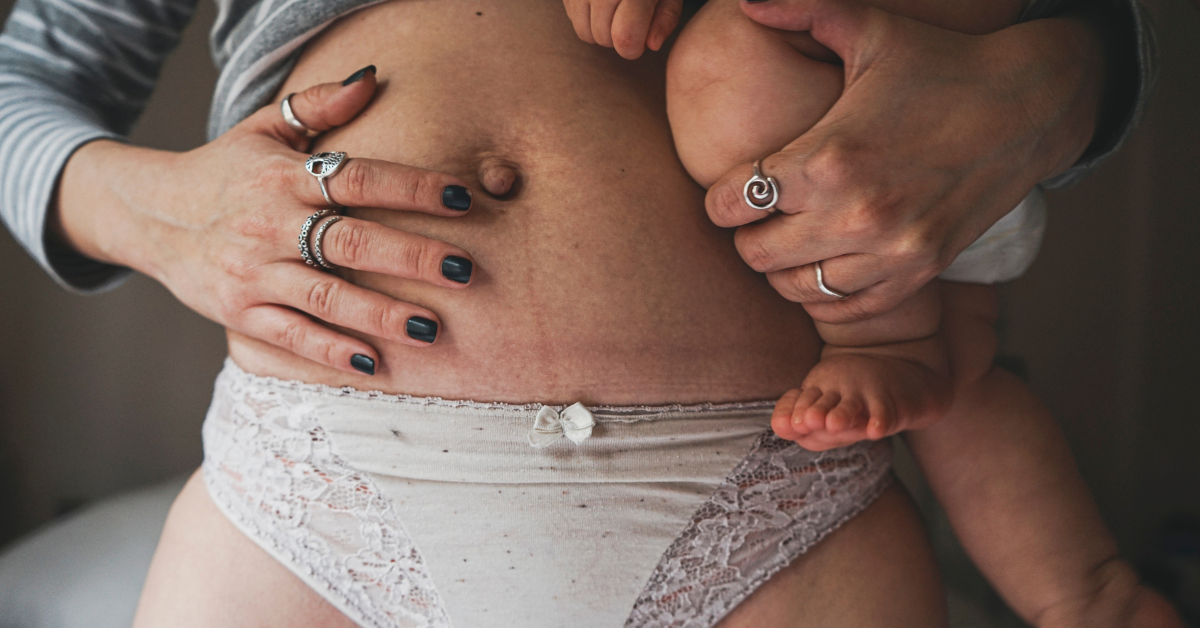During the early stages of postpartum there are many changes, filled with joy, new experiences, and plenty of adjustments. During this early period, you’ll bond with your baby while also taking care of yourself and recovering. By focusing on your needs and your baby’s, you can thrive together during these special early days.
Understanding the First Month Postpartum
The first month after having a baby is a time of big changes for new mothers. During this time, your body goes through a lot as it heals. You might feel uterine contractions, experience postpartum bleeding, and notice that your breasts feel full. At the same time, your emotions may be all over the place as your hormones change and you start caring for your newborn.
It’s really important to focus on self-care during this period. Self-care isn’t just about getting better; it also helps you build a strong foundation for yourself and your baby. Many new moms feel overwhelmed by everything that’s happening, and that’s completely normal. Understanding how important this time is can help you focus on what you need, allowing you to be kinder to yourself as you adjust to motherhood.
Self-care means taking care of your feelings and asking for help when needed. Remember, taking time for yourself isn’t just good for you; it helps you be there for your baby too. With a focus on self-care, you can face this new chapter with strength and confidence. So, take a moment for yourself and enjoy this journey!
Physical Recovery After Birth
Recovering physically after childbirth is a crucial part of your postpartum journey. Whether you had a C-section or a vaginal birth, your body needs time, rest, and gentle care to heal completely. Managing any discomfort you feel is important for your comfort and overall well-being. You can consider options like over-the-counter pain relief, prescribed medications, and light stretches to help support your recovery.
If you had a C-section, it’s very important to follow your healthcare provider’s advice on wound care and activity limits. Light walking can help with circulation, but remember to avoid heavy lifting during these early weeks. On the other hand, if you had a vaginal birth, simple comforts like sitz baths and cold packs can provide relief from discomfort and swelling in the perineal area.
As you begin to regain your strength, take your time and ease into physical activity at a pace that feels right for you. Once your provider gives you the go-ahead, gentle pelvic floor exercises can help rebuild strength and support your recovery. Remember, every mother’s healing journey is unique, so be patient with yourself and allow yourself the grace to adjust to this new chapter in your life.
Emotional Well-being After Giving Birth
The emotional journey after childbirth can feel like a rollercoaster ride, filled with both joyful highs and exhausting lows. As you navigate these feelings, remember that this is a natural and important part of the postpartum experience. Many new mothers experience a wide range of emotions, from happiness to worry, as they adjust to their new role.
During this time, prioritizing your emotional well-being is essential. Taking moments to relax and engage in soothing activities can make a big difference. For instance, practicing mindfulness techniques like deep breathing or meditation can help bring you peace amid the emotional whirlwind, providing much-needed calm and clarity. Additionally, it’s important to recognize when your emotions become overwhelming.
Reaching out for support is a powerful step you can take. Connecting with loved ones, joining a support group, or talking with a mental health professional can offer comfort and new perspectives. Keep in mind that postpartum depression is a common experience for many new mothers, and seeking help early on can truly make a positive impact on your well-being.
Breastfeeding Support During Early Postpartum
Breastfeeding offers rewards and challenges for new mothers, yet it can become a truly fulfilling experience with the right support and techniques. Establishing a good latch from the start is key, as correct positioning helps prevent nipple soreness and ensures effective milk transfer, setting the stage for a successful breastfeeding journey.
By recognizing early hunger cues—like rooting or sucking motions—you can respond promptly, helping maintain milk supply and fostering a strong bond. In these first days, frequent feeding stimulates milk production, encouraging a nourishing rhythm that strengthens the breastfeeding relationship.
To support milk supply, prioritize hydration and balanced nutrition. Drinking plenty of fluids and enjoying nutrient-rich foods provides your body with what it needs for optimal lactation. And if challenges come up, remember that lactation consultants are available to offer guidance and reassurance, helping you navigate any bumps along the way.
Sleep and Rest Postpartum
Sleep deprivation is a common reality for new mothers, yet prioritizing rest is crucial for recovery and well-being. By syncing your sleep with your baby’s schedule, you can capture moments of rest, bridging the gap from interrupted nighttime sleep. Napping when your baby naps is a practical way to recharge during those early weeks.
Creating a peaceful sleep environment further supports quality rest. Dimming the lights and reducing noise in your sleep space signals to your body that it’s time to unwind. Enlisting support from your partner or family members to share nighttime duties can also provide essential relief, allowing you to get more continuous sleep.
Adjusting your expectations around sleep can ease feelings of frustration. Remember, disrupted sleep is only temporary. Focusing on small moments of rest and prioritizing these breaks can alleviate anxiety and help you feel recharged, supporting both you and your little one.
Nutritional Needs When Newly Postpartum
Maintaining a healthy postpartum diet is essential for both recovery and successful breastfeeding. By focusing on nutrient-dense foods, you give your body the energy and vitamins it needs to heal and produce nourishing milk. Incorporate whole grains, lean proteins, fresh fruits, and colorful vegetables to keep your diet balanced and satisfying.
Staying hydrated is just as important as it supports vital bodily functions and helps maintain your milk supply. Make a habit of drinking water regularly throughout the day, and keep nutritious, easy-to-grab snacks on hand to sustain your energy.
By listening to your body’s hunger cues and practicing mindful eating, you can nurture your overall well-being and resilience. Avoid restrictive diets unless specifically recommended by your healthcare provider; right now, your body needs the full support of a well-rounded diet.
Bonding with Baby
Building a strong parent-child bond is one of the most rewarding parts of the postpartum journey. Through skin-to-skin contact, you can deepen this bond and offer comfort to both yourself and your baby. Holding your little one close fosters a feeling of security and a profound sense of connection.
Adding responsive interactions—like talking, singing, and maintaining gentle eye contact—further enriches your bond. These moments support your baby’s brain development and emotional growth, creating a warm, nurturing environment that encourages curiosity and connection.
Embrace the small joys found in everyday moments, such as bath time or feedings, as they enhance the bonding experience. Celebrating each little milestone and savoring your time together creates a foundation for a lifelong, loving relationship.
Social Support During the Postpartum Period
Building a supportive network is essential for new mothers as they navigate the postpartum period. Leaning on family, friends, and other moms can provide encouragement, practical advice, and hands-on help when you need it most. Sharing your experiences and listening to others’ stories can ease any feelings of isolation, helping you feel connected and understood.
Reaching out to professionals, such as postpartum doulas or local support groups, offers an additional layer of tailored support. These experts bring guidance and reassurance that can foster your confidence as you settle into this new role.
Keeping communication open with loved ones about your needs and boundaries strengthens these relationships. Accept offers of help and delegate tasks when possible to create a supportive environment that lightens the load and allows you to focus on bonding with your baby.
Postpartum Support with Midwife360
The first month postpartum is a time of discovery, adjustment, and immense growth. As new mothers learn to balance their needs with those of their newborns, focusing on physical recovery, emotional well-being, and building meaningful connections creates a nurturing foundation for both mother and baby.
Midwife360 offers dedicated postpartum care to guide you through these precious weeks with the support you need. Prioritizing self-care, leaning on a supportive network, and celebrating each small victory can transform the postpartum experience into a fulfilling journey. The expert team at Midwife360 is here to provide personalized guidance, answer questions, and help you navigate any challenges along the way.
Share your own postpartum experiences, or reach out to the Midwife360 team for compassionate, professional support tailored to your needs. Every mother’s journey is unique, and Midwife360 is here to ensure that yours is as supportive and empowering as possible. Trust yourself, and embrace each new day with confidence and care.





